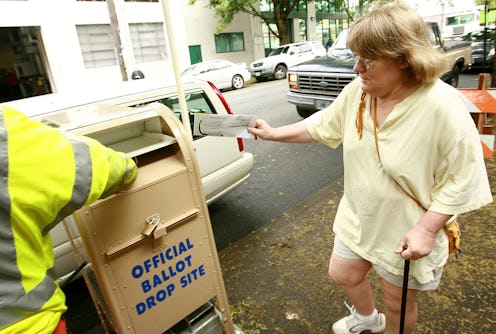News
As Many As One Million Voted In The Oregon Primary
Despite the trends across the nation this primary season of lower voter turnout — almost universally stemming from a big drop in Democrats casting ballots — Oregon may see more than 1 million voters participate in the Democratic and Republican primaries that ended there Tuesday. That would match 2008 and add Oregon to the limited number of states that have bucked the trend and saw a steady or increased turnout among Democrats and not just Republicans.
Interestingly, though, it's too early to say. According to the Secretary of State, nearly 835,000 Oregonians had submitted their ballots by Monday. They had until Tuesday at 8 p.m. to do so, though, and vote tallies are still being finalized. The Associated Press puts the total number of votes at nearly 798,000 as of early Wednesday, but only 74 percent have been counted according to the news agency's estimates. Oregon has a vote-by-mail balloting system, which means not all the ballots come in at once.
The way it works is pretty simple. Ballots are mailed out about two to three weeks in advance by county election officials — in this case in late April. The voter can put a stamp on the ballot and mail it in, or it can return the envelope to a designated ballot drop site, which are located across the state. Even though voters can vote early, many wait. "Many people still wait until Election Day to turn in their ballot. That's okay," Secretary of State Jeanne Atkins said.
The system has drawn accolades since it was first implemented in 2000. The other two states who vote by mail are Washington and Colorado. Oregon Democratic Sen. Ron Wyden proposed taking the system nationwide this month, introducing a bill that would require all federal elections be conducted through the mail. He's hoping long lines for primary elections in other states will motivate D.C. to consider it.
Because of the mail system, there are not precincts counting the votes. The Associated Press's 74 percent is just an estimate based on the number of ballots received before Tuesday. If another quarter of the ballots still haven't been counted, it would definitely put the voting over 1 million. Whether that happens or not, one thing is for certain, the winners.
The AP called the race for Sanders. At this point, he has nearly 55 percent of the vote, with just over 263,000 votes cast. That would put him on track to come in a couple thousand behind Obama's vote total of nearly 361,000 in 2008 by the end of the night. Hillary, while still coming in second, should beat her own vote totals from 2008. In that election she won just 41 percent of the vote with slightly more than 252,000. She should end the night with nearly 300,000 votes.
In the Republican race, Donald Trump was of course the winner. His opponents did pretty well, though considering they have dropped out. He currently has nearly 67 percent of the vote. He should finish the night just over John McCain's 2012 vote totals, if the returns stay consistent.
The Oregon primary won't have changed much in terms of the race. Trump's still unopposed and the Sanders-Clinton delegate differential should remain about the same because the delegates are allocated proportionally. What you can see, though, is how vote by mail can keep turnout strong, even in less exciting election years.
